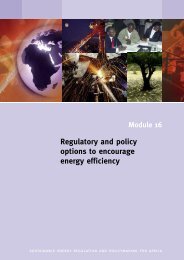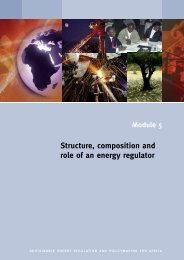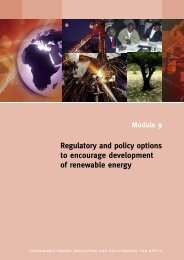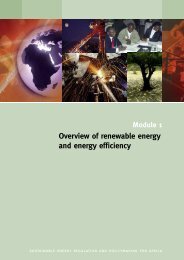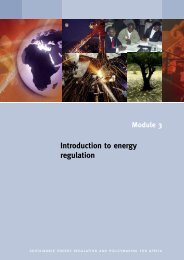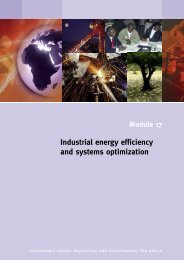Increasing access to energy services in rural areas - REEEP ...
Increasing access to energy services in rural areas - REEEP ...
Increasing access to energy services in rural areas - REEEP ...
You also want an ePaper? Increase the reach of your titles
YUMPU automatically turns print PDFs into web optimized ePapers that Google loves.
MODULE 10: INCREASING ACCESS TO ENERGY SERVICES IN RURAL AREAS<br />
page 10.27<br />
Pric<strong>in</strong>g <strong>rural</strong> <strong>energy</strong> <strong>services</strong> is a dilemma issue. High prices for the <strong>services</strong> will<br />
be beyond the affordability of <strong>rural</strong> people and low pric<strong>in</strong>g will result <strong>in</strong> it be<strong>in</strong>g<br />
difficult <strong>to</strong> <strong>in</strong>duce the necessary <strong>in</strong>vestment from commercial banks and private<br />
<strong>in</strong>ves<strong>to</strong>rs. In most cases, the immediate priority of deal<strong>in</strong>g with <strong>rural</strong> <strong>energy</strong><br />
poverty is <strong>to</strong> provide a m<strong>in</strong>imum amount of <strong>energy</strong> <strong>to</strong> meet people’s basic needs,<br />
irrespective of their ability <strong>to</strong> bear the costs of supply and delivery.<br />
So subsidies on prices are one measure used <strong>to</strong> lower the cost of <strong>energy</strong> service<br />
<strong>in</strong> <strong>rural</strong> area. For example, <strong>in</strong> the Ch<strong>in</strong>ese village solar power programme implementation,<br />
the government proposed a price subsidy, so that the <strong>rural</strong> people only<br />
pay the operat<strong>in</strong>g cost, and the government will pay the <strong>in</strong>vestment cost. Even<br />
so, most of the households still need <strong>to</strong> pay about RMB 2 per kWh <strong>in</strong> contrast <strong>to</strong><br />
the grid power sales price of about RMB 0.5 per kWh. This is still beyond the<br />
affordability of <strong>rural</strong> poor; therefore some households <strong>in</strong> the PV powered villages<br />
are turn<strong>in</strong>g back <strong>to</strong> candles or kerosene.<br />
In the longer term, it is necessary <strong>to</strong> accelerate the “modernization” of the <strong>rural</strong><br />
<strong>energy</strong> sec<strong>to</strong>r, <strong>to</strong> facilitate and susta<strong>in</strong> productive economic activities <strong>in</strong> <strong>rural</strong><br />
<strong>areas</strong>, which will hopefully ensure economic and f<strong>in</strong>ancial susta<strong>in</strong>ability and<br />
<strong>in</strong>crease <strong>rural</strong> people’s self-reliance.<br />
The enabl<strong>in</strong>g environment<br />
The local government clearly plays a crucial role <strong>in</strong> the provision of subsidies,<br />
even where it has been “rolled back” from direct <strong>in</strong>volvement <strong>in</strong> provid<strong>in</strong>g <strong>energy</strong><br />
<strong>services</strong> <strong>to</strong> poor people. However, subsidies should not be considered <strong>in</strong> isolation<br />
from other aspects of government <strong>in</strong>tervention. Although the climate is grow<strong>in</strong>g<br />
more favourable <strong>to</strong> decentralized <strong>energy</strong> supply options, <strong>in</strong> most countries the<br />
exist<strong>in</strong>g regula<strong>to</strong>ry framework is often the major barrier <strong>to</strong> such development. It<br />
can be hostile, contradic<strong>to</strong>ry or uncerta<strong>in</strong>. Taxes and subsidies still often underm<strong>in</strong>e<br />
markets, rather than encourage them. The support<strong>in</strong>g <strong>in</strong>frastructure of tra<strong>in</strong><strong>in</strong>g<br />
<strong>in</strong>stitutions, or f<strong>in</strong>ance may be non-existent or <strong>in</strong><strong>access</strong>ible. Competi<strong>to</strong>rs may<br />
be able <strong>to</strong> ga<strong>in</strong> privileged <strong>access</strong> <strong>to</strong> subsidies that enable them <strong>to</strong> sell their products<br />
below cost. Without changes <strong>to</strong> this policy environment, the flow of private<br />
sec<strong>to</strong>r f<strong>in</strong>ance and <strong>in</strong>novation will be restricted. These are the <strong>areas</strong> currently at<br />
the focus of much analysis, <strong>in</strong>novation and reform.<br />
The role of the <strong>energy</strong> regula<strong>to</strong>r<br />
The overall role for an <strong>energy</strong> sec<strong>to</strong>r regula<strong>to</strong>r <strong>in</strong> a liberaliz<strong>in</strong>g power market is<br />
<strong>to</strong> ensure a levelled play<strong>in</strong>g field and <strong>to</strong> overlook the proper function<strong>in</strong>g of the<br />
power market.



